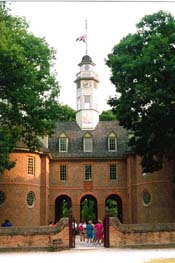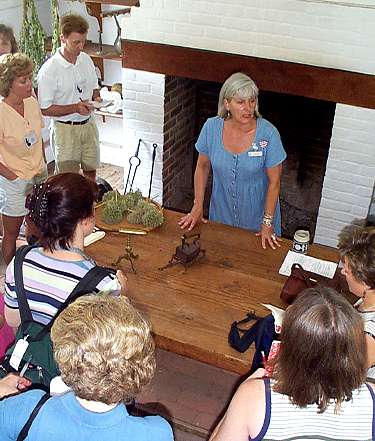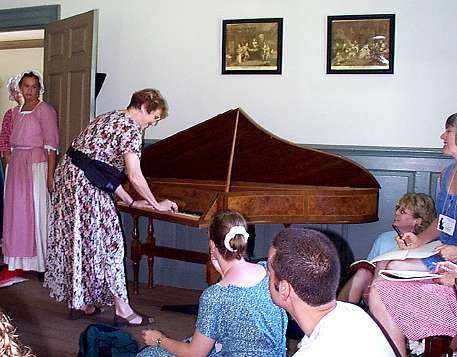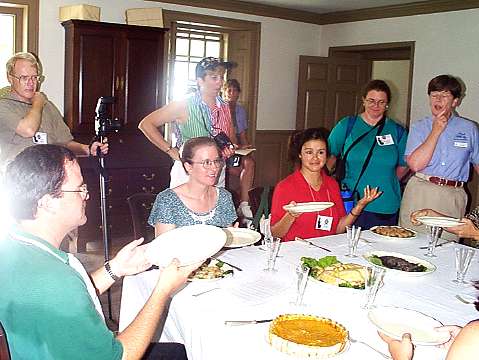Page content
How Do I Find The Shillings to Attend the Colonial Williamsburg Teacher Institute?
Contents:
Introduction
What Is the Colonial Williamsburg Teacher Institute?
Why Do I Want to Attend the Teacher Institute in Williamsburg?
Where Do I Find My Pot of Gold?
How Do I Get the Shillings?
I've Got the Shillings. What Do I Do Now?
Appendix A: Proposal
Appendix B: Possible Funding Sources
Appendix C: Sample Letter
Introduction
Attending the Colonial Williamsburg Teacher Institute
is an experience that past participants have found extremely rewarding. It has
enhanced their professional lives, enabled them to become part of a teachers'
network, and provided them with resources and instructional strategies that
they can take into their classrooms. The program has proven to be an experience
that many have looked back upon as the highlight of their careers.

Many teachers would like to take advantage of this opportunity but find financing this endeavor a daunting challenge. It needn't be! In this publication we have attempted to provide resources and ideas that will enable you to obtain the necessary financial support that will permit you to participate in this program.
When one considers the benefits to the participants, their students, and the community, it
should be evident why the number of individuals attending the Teacher Institute has grown each
year. Financial assistance is available; it is just a matter of finding it. Good luck in your
quest!
What Is the Colonial Williamsburg Teacher Institute?
Initiated in the summer of 1990, the Colonial Williamsburg Teacher Institute is an intensive, week-long workshop that immerses participants in early American history "on location" in Williamsburg, the restored capital of 18th-century Virginia. Teachers engage in a number of interdisciplinary activities with colonial American history as the focus. Teachers have the opportunity to exchange ideas with historians, meet character interpreters and become part of the story. Throughout each day, teachers work collaboratively with Colonial Williamsburg staff and Master Teachers to examine interactive teaching techniques and develop instructional materials that bring history to life in the classroom.
All the programs use integrated techniques and a diverse perspective to tell
the story of Virginia's shift from British rule to self-government. The controversies
and sequence of events during the colonial period are examined as forerunners
to the Constitution and the Bill of Rights. As a result of attending the Teacher
Institute, all participants will be able to identify significant 17th- and 18th-century
events that continue to shape and define our nation; understand how people of
various cultural backgrounds interacted with one another during this period;
engage in studies exploring Native American, European, and African economic,
cultural, and political heritages; develop higher-level critical thinking skills
through the examination of primary source documents and artifacts; and develop,
implement, and share innovative teaching strategies that encourage active learning,
interdisciplinary studies, and critical thinking.

Tuition includes: A double-occupancy room [Note: Teachers who would like their own room pay an additional fee.], most meals, admission to all Historic Area sites and program activities, and special access to materials in the Teacher Institute portion of our Education Resource Library. Teachers may apply for
three hours of graduate credit from the University of San Diego for an additional fee of $225.00*.
Why Do I Want to Attend the Teacher Institute in Williamsburg?
Social studies educators throughout the nation are grappling with a multitude of challenges including how to meet State and National Standards while at the same time meeting the needs of all learners in increasingly diverse classroom settings. The Colonial Williamsburg Teacher Institute is designed to provide participants with the necessary tools to achieve these goals.
During their stay in Williamsburg, teachers:
- Study colonial history on the sites where it actually occurred.
- Interact with the people who "made" history (such as Thomas Jefferson, Patrick Henry, or Martha Washington), who are portrayed by character interpreters.
- Utilize and obtain innovative instructional resources and lessons that they will be able to use in their classrooms.
- Share experiences and ideas with teachers from around the United States.
- Analyze historical events from multiple perspectives utilizing a wealth of primary and literary sources.
- Meet and interact with historians.
- Review materials and programs designed to meet national and state social studies standards.
 The ultimate benefit from this experience comes when participants return home
and share their knowledge with their students and colleagues. The teachers have
the necessary expertise to develop units that will meet changing curriculum
requirements. Through their teaching and workshop presentations, the impact
Teacher Institute attendees have on their communities is far reaching.
The ultimate benefit from this experience comes when participants return home
and share their knowledge with their students and colleagues. The teachers have
the necessary expertise to develop units that will meet changing curriculum
requirements. Through their teaching and workshop presentations, the impact
Teacher Institute attendees have on their communities is far reaching.
Comments from past participants support the value of the institute:
"The few days we've been here have been filled with ways to see, hear, smell, taste, and touch the past."
"The Williamsburg experience is so powerful; I've never had the opportunity to relive the past in such a rich manner."
"The opportunity we have experienced this week has been exceptional; I can't tell you how much I will always treasure this week of learning."
"Please know that through us you touch the adults of tomorrow. You have made a difference."
Finally, Williamsburg is a great place to spend a week in the summer!
Where Do I Find My Pot of Gold?
In seeking sources of funding, there are two general areas to which you should devote your attention: groups and organizations that you can approach directly and foundations that provide educational grants.
Start by looking around your community and identifying businesses, industries, professional organizations, service clubs, etc. that have supported education and civic causes in the past. Don't neglect small donors; remember, if you can get four groups to give you $550.00 each, you will have the funds you need. With these organizations your goal is to set up a meeting with key individuals in order to explain the Colonial Williamsburg Teacher Institute and request financial support.

The other possibility is to submit a grant to local, state, or national foundations that finance various projects. Here you will need to target those organizations that have funded educational causes in the past. Also, don't forget your local region. There are numerous smaller community foundations throughout the country that exist primarily to support programs in their area. They may not give out large sums of money, but you are not looking for tens of thousands of dollars. In addition remember to check references in your local library and also the Internet for other funding sources.
You need to decide what your best options are, then plan and aggressively pursue a course of action that will enable you to obtain the financial support you need.
How Do I Get the Shillings?
Once you decide how you wish to proceed, plan your strategy. If you intend to approach organizations or individuals in your community, consider the following:
- Identify potential donors.
- If you are approaching an organization, club, service group, etc., try to find out the name of the individual who is responsible for dealing with requests such as yours.
- Write a letter to the appropriate party briefly outlining your intentions and seeking to set up an appointment. Use letterhead from your school to demonstrate your administration's support for your efforts.
- Call the individual within a reasonable period of time to try and schedule a meeting.
- If a meeting is arranged, go in prepared to state your purpose and make your request. Take along additional information about the Colonial Williamsburg Teacher Institute and leave copies with your contact. Try to find out when a decision will be made regarding your proposal and when you will be notified.
- Follow up with a thank you note.
- If it is not possible to arrange a meeting, see if you can still submit a more formal proposal for consideration. Should a formal proposal be acceptable, determine whether the group has any guidelines for such an application and follow the procedures. If there are no guidelines, provide the necessary background information regarding the institute, state your purpose, and indicate the amount of financial support you are seeking. (Don't be deterred by the application process. Usually specific questions are asked that can be answered directly and briefly.)
- Stress the benefits to the community resulting from your participation in this program.
On the other hand, if you are considering submitting a formal grant application, you need to keep the following in mind:
- Grant applications are acted upon at various times of the year. Make sure you know the dates when decisions will be made so that you will have a response in time to make your plans.
- Obtain the necessary forms and follow the guidelines explicitly.
- Write clearly, precisely, and persuasively in simple sentences.
- Be assertive yet tactful and patient in pursuing grant support.
- Make sure your goals are clearly described.
- Write a concise but adequate description of your needs.
- Provide a realistic budget.
- Avoid typographical errors and supply the required number of copies of the proposal.
Whether you are looking for foundation or organizational funding, make your first contact as strong as possible. If it is written, keep it short, to the point, and compelling. If it is personal, be confident, friendly, and knowledgeable about the organization's interests, what you want, and why. In either case, it would be beneficial to illustrate your interest in colonial history by including photos of activities you have engaged in with your students on this topic.
Keep in mind the competition for funds is growing in every area. The keys to success are the acquisition of good information about the potential donor, organization, clear presentation, a unique request, and evidence that this is a worthwhile endeavor.
I've Got the Shillings. What Do I Do Now?
Once you have secured the necessary funds, there are a number of initiatives that you will need to consider taking.
- If you have obtained the money through a grant, make sure you complete all the requirements necessary to acquire the funds. They will be clearly spelled out by the foundation or organization.
- If your funding is through a local organization or donor, send a thank you note to the individual you dealt with. In the note, summarize the agreement as you understand it to ensure that there is no miscommunication between you and the granting agency. This step certainly needs to be handled tactfully, but it is important.
- Should it be appropriate, publicize the donor's support of your efforts. Photographs and an article submitted to the local newspaper are generally appreciated by the organization, business, etc.
- After attending the Teacher Institute, additional publicity and a sharing of your experiences are things you should do. These activities provide you with an opportunity to thank your donor again and indicate how you intend to use the knowledge you have gained from your participation.
Remember that appropriate follow-up is not only the courteous thing to do but is also a way of setting the stage for some of your colleagues. If the donor believes that it was worthwhile to support your participation, he/she may be inclined to do the same for other teachers.
